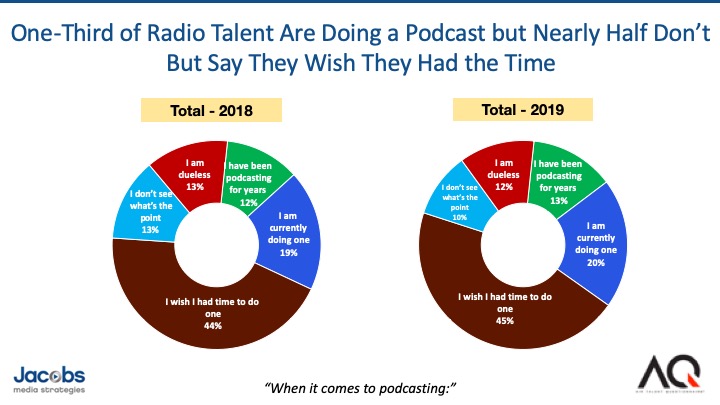
We recently revealed the results from our second annual Air Talent Questionnaire, an anonymous online survey of more than 1,000 on-air radio talents. We presented the results at Morning Show Boot Camp last month, and you can also see them as part of our webinar on September 4th.
In the survey, we asked radio DJs if they were podcasting. While one third of them reported that they are currently podcasting, two thirds are not. Some of those aren’t because they don’t know how or don’t see the point, but 45% of DJs say they’s like to be podcasting but don’t have the time.

Which raises an important question: What are these on-air talents doing with their time?
I don’t ask that question facetiously; I know what they’re doing — two or three jobs that were once handled by other personnel. Over the last few decades, voicetracking tools enabled DJs to leave the on-air studio, while corporate consolidation necessitated their presence outside the studio. The results is airstaffers that are pulling double duty as promotion directors or music directors or even salespeople.
I often hear grumbling about the evils of voicetracking and automation software. I was a DJ, and I never found the act of cueing up records or loading CD players or pulling carts from the rack to be a particularly enthralling part of the job. I’d rather have the computer do that! Frankly, automation and voicetracking are fantastic technologies if they allow radio on-air talent to do more of what they’re best at: create compelling audio content. If these technologies free DJs up to create podcasts, that’s a huge win.
If an on-air personality is particularly engaging when they’re interviewing local bands or talking about craft beer or ranting about their parenting troubles, let them run with it in a podcast. Stars are hard to find, so if you’ve got some on your staff, don’t bury them in Selector logs or banish them to the production studio. Encourage them to explore the podcasting space, and give them the time to do so.
Unfortunately, that doesn’t seem to be happening. Instead, many broadcasting companies are using these technologies to free on-air talent to do things that they’re not necessarily good at. There are far more overlapping skills required in the making of a good radio show and a good podcast than there are, for example, in the creation of a good radio show and the scheduling of a music log. There’s no reason to believe that a great on-air talent will also make a great promotions director or production director or even program director. So why combine these roles at the expense of podcasting? That seems like a misallocation of the airstaff’s talent.
To be fair, I know what the response to this argument is: We need music logs and promotional appearances, we don’t need podcasts. But that might change. A well-crafted podcast may be able to reach more listeners and command more sponsorship dollars than a van stop. If it does, don’t you want your best air talent spending their time on podcasts?
See More Results from the Air Talent Questionnaire
On Wednesday, September 4th, Fred will host a webinar showcasing the results from our survey of on-air talent. If you want to know how your peers feel about the radio industry, please join us.
- A Simple Digital Treat to Thank Your Radio Listeners This Thanksgiving - November 13, 2023
- Interview Questions When Hiring Your Radio Station’s Next Digital Marketing Manager - November 6, 2023
- A Radio Conversation with ChatGPT: Part 2 – Promotions - October 30, 2023





Interesting survey results. Not much change year-to-year. One thing that might be useful is a list of existing podcasts produced by radio talent. The 22% who are cluless / don’t see the point, might be informed (inspired?) by exposure to examples. I would certainly be interested in knowing more about what’s out there, how much is original vs. archived air content.
Brad, lots of questions, to be sure. We interviewed to Steve Lickteig of MSNBC/NBC who doesn’t have this issue in TV news. His anchors and reporters want to be podcasters.
Having friends in TV and asking about their jobs, there are FAR more responsibilities and tasks being expected from radio.
TV anchors may have the time and want a place to be creative. In Radio, our time and original ideas are already being use planning, creating, and executing our show, creating and engaging social media, archiving and uploading audio bits to our websites, creating digital content, podcasting, producing syndicated shows that air on ours stations, maintaining web filler, production, endorsement upkeep, participating in non-profit organizations, and promotional appearances. Many of these things are not expected from TV, which would be the big difference there.